March Parable, Saint & Virtue

Each month at Our Lady of Sorrows we explore a particular parable of Jesus, a saint from the great cloud of witnesses that surround us (see Hebrews 12:1), and a virtue (generally taken from the fruits of the Spirit [Galatians 5:22-23, 2 Corinthians 6:6, Ephesians 5:9, & 2 Peter 1:5-7] or the cardinal & theological virtues). The parable, saint and virtue are incorporated into our morning prayer, religion bulletin boards and religion classes. This focus on one parable, one saint and one virtue complements our Words of Wisdom program and serves as a supplement to our religion curriculum. This month we focus on the parable of the Prodigal Son (Luke 15:11-32), the virtue of Kindness, and St. Katharine Drexel.
Jesus said: There was once a man who had two sons. The younger said to his father, ‘Father, I want right now what’s coming to me.’
So the father divided the property between them. It wasn’t long before the younger son packed his bags and left for a distant country. There, undisciplined and dissipated, he wasted everything he had. After he had gone through all his money, there was a bad famine all through that country and he began to hurt. He signed on with a citizen there who assigned him to his fields to slop the pigs. He was so hungry he would have eaten the corncobs in the pig slop, but no one would give him any.
That brought him to his senses. He said, ‘All those farmhands working for my father sit down to three meals a day, and here I am starving to death. I’m going back to my father. I’ll say to him, Father, I’ve sinned against God, I’ve sinned before you; I don’t deserve to be called your son. Take me on as a hired hand.’ He got right up and went home to his father.
When he was still a long way off, his father saw him. His heart pounding, he ran out, embraced him, and kissed him. The son started his speech: ‘Father, I’ve sinned against God, I’ve sinned before you; I don’t deserve to be called your son ever again.’
But the father wasn’t listening. He was calling to the servants, ‘Quick. Bring a clean set of clothes and dress him. Put the family ring on his finger and sandals on his feet. Then get a grain-fed heifer and roast it. We’re going to feast! We’re going to have a wonderful time! My son is here—given up for dead and now alive! Given up for lost and now found!’ And they began to have a wonderful time.
All this time his older son was out in the field. When the day’s work was done he came in. As he approached the house, he heard the music and dancing. Calling over one of the houseboys, he asked what was going on. He told him, ‘Your brother came home. Your father has ordered a feast—barbecued beef!—because he has him home safe and sound.’
The older brother stalked off in an angry sulk and refused to join in. His father came out and tried to talk to him, but he wouldn’t listen. The son said, ‘Look how many years I’ve stayed here serving you, never giving you one moment of grief, but have you ever thrown a party for me and my friends? Then this son of yours who has thrown away your money on prostitutes shows up and you go all out with a feast!’
His father said, ‘Son, you don’t understand. You’re with me all the time, and everything that is mine is yours—but this is a wonderful time, and we had to celebrate. This brother of yours was dead, and he’s alive! He was lost, and he’s found!’ (Luke 15:11 - 32, The Message)
The story holds a wealth of wisdom, but two themes stand out during Lent:
- The son who demands his inheritance in the story represents us. Once he gets what he wants he wastes his new found wealth in selfish pursuits. It’s only after he hits rock bottom that he decides to journey back to his father and ask forgiveness. During this holy season of Lent we are challenged to recognize our own sinfulness, and make a similar journey to our Heavenly Father, asking for and receiving his forgiveness through our celebration of the Sacrament of Penance and Reconciliation.
- The son who stayed faithful to his father represent us as well, especially those of us who regularly practice our faith. We can become so “righteous” that we start to unjustly judge those who we consider to be “less Christian” than we are, whether that’s because of their Church attendance, their choice of livelihood, the way they dress, the music they listen to, their country of origin, or any other number of criteria. We are challenged during this season of Lent to pray, fast and give to charity to help us break down that hardness of heart that leads us to unjustly judge others because they sin in different ways than we do.
Virtue of the Month: Kindness
Tied closely to our monthly parable is the virtue of kindness. Kindness is a habit that strengthens our ability to give of ourselves to others, without asking for or expecting anything in return. We model that self-sacrificing attitude on Jesus, who gave everything he had – even his very life – to try and show us the depth of God’s love. Kindness helps us to accept the circumstances of our lives (unlike the first son) and allows us to celebrate the circumstances in other people’s lives (unlike the second son). While this virtue begins in our heart and souls, kindness is incarnated through our actions to others – small, medium or large acts of love and service that help spread the radiant joy of our kind and merciful God.
May this month help us practice the virtue of kindness so that we may rejoice with all the angels and saints during this holy season of Lent.
Saint of the Month: St. Katharine Drexel
St. Katharine Drexel was born in Philadelphia on November 26, 1858 to a wealthy and devout family. Her parents set a great example of putting their faith - especially the spiritual and corporal works of mercy - into action, and Katharine took that lesson to heart. After speaking with Pope Leo XIII in 1887, Katharine followed the prompting of the Holy Spirit and took vows as a nun with the express purpose of helping Native Americans and African Americans who were living in poverty.
Katharine spent the rest of her days teaching and raising funds for those two disenfranchised communities. She financed the publication of a Navajo-English catechism and founded Xavier University in New Orleans, the first Catholic University in the United States for African-Americans. By the time of her death, she had more than 500 Sisters teaching in 63 schools throughout the country and she established 50 missions for Native Americans in 16 different states (http://www.catholic.org/saints/saint.php?saint_id=193).
St. Katharine exemplifies our virtue for the month, reminding us that those who are lucky enough to be born into wealth and privilege as well as those who have worked hard to earn that are called by God to help the poorest in our area and around the world. May this Lent challenge us to practice kindness in imitation of the kindness that St. Katharine incarnated to all.
Blessings & Peace,
Hugo De La Rosa III
Lent 2018

Prayer, fasting and almsgiving are the three ways that Jesus talks about our Lenten preparation in the Gospel reading for Ash Wednesday. These three avenues to holiness are traditionally prescribed for all Catholics, especially during Lent. Here are some ways we can incorporate these disciplines into our daily life, and especially into our Lenten sacrifices.
Prayer
When you pray, go to your inner room, close the door, and pray to your Father in secret.
Jesus said these words in the context of religious professionals who would pray for human acclaim. They prayed not so much out of a sincerity of heart, but for the sole purpose of having other people see them pray. They thrived on knowing that others thought they were holy and spiritual.
For our Lenten prayer discipline, we would do well to establish a regular habit of prayer. Morning and evening are natural times for prayer. We can rise 15 minutes earlier and spend some time in prayer, or we can wait until our house has settled down and make some time at night. In either case, a simple formula for prayer could flow like this:
- Take some time to still your body, quiet your breathing, silence your voice, and turn your thoughts towards God. (1 minute)
- Thank God for at least three (3) minutes. See how many different people, situations and things you can think of to give thanks for. (3 minutes)
- Acknowledge your faults before God - spend some time confessing your sins, failures, mistakes and regrets, and ask for God’s forgiveness .(3 minutes)
- Bring your petitions before God - pray for your family and friends, for our nation, for our Church, and for anyone who has asked you for their prayers. (3 minutes)
- Read Scripture - if you’re not sure what to read, open up Mark’s Gospel in the New Testament and read 1 chapter each time you pray. In less then 3 weeks you’ll have read through one full Gospel. (3 minutes)
- Listen for God’s voice - after talking and reading, spend the remaining two minutes listening for the still, small voice of the Holy Spirit. ( 2 minutes)
Fasting
But when you fast, anoint your head and wash your face, so that you may not appear to be fasting, except to your Father who is hidden.
Jesus spoke this in the context of people who would fast (not eat or drink) and then make a spectacle of it - they were, once again, looking for human praise. We can fast in secret by trying the following:
Food: We live in a country of such abundance that we sometimes forget that in other parts of our world (and in parts closer to home) some people go without food or live on very little food on a day to day basis. We can limit our intake of food and drink to remind ourselves of others, to stand in solidarity with them, and as a prayer for those who do not have enough to eat.
Electronics: We live in a world inundated with gadgets - cell phones, smart watches, mp3 players, laptops, computers, gigantic TV’s, etc. A challenging fast would be to go without non-essential electronics for a day, a week or all of Lent. It would help remind us that life is not always fast or convenient, and it would serve as a welcome antidote to the overloads of information and noise we sometimes try to process.
Almsgiving
But when you give alms, do not let your left hand know what your right is doing, so that your almsgiving may be secret.
Most Catholic parishes will have stewardship drives where we are asked to contribute our “time, talent and treasure.” Lent is a wonderful time for us to make sacrifices of all three of those precious commodities. We can spend more time on family and less on work or individual pursuits; more money on charities and less on frivolous spending; and more talents in the service of the poor and homeless in our midst. It is a great way to expand our self-centeredness into other-centeredness.
In whatever way you mark this Lent, I pray that it draws you closer to the suffering Servant. May we all become imitators of this Servant Messiah in our thoughts, words, and deeds.
Blessings & Peace,
Hugo De La Rosa III
Diocesan Inservice Service Awards
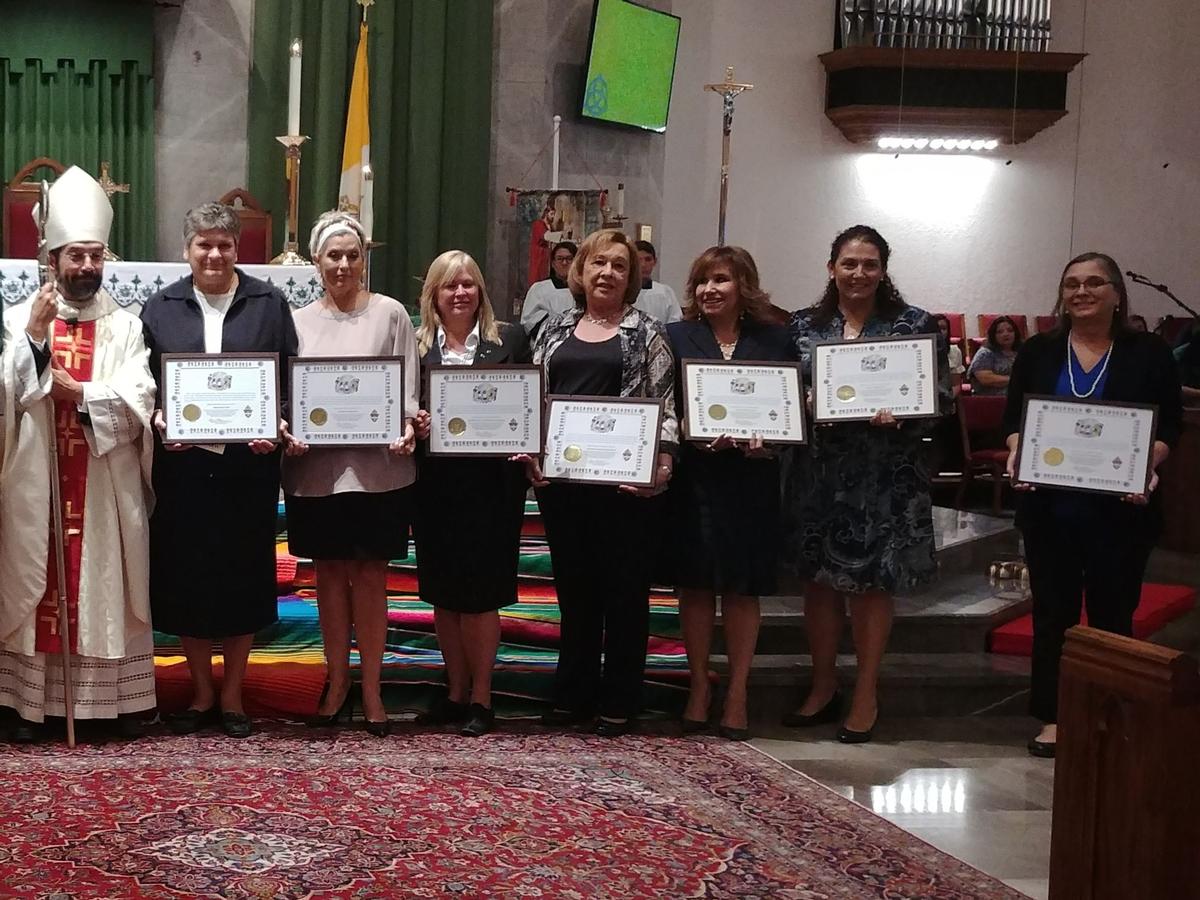
Every year Bishop Flores, though the Diocesan Catholic Schools Office, honors Cathlic School staff who have served in the diocese for 5 year increments. This school year we were blessed to have the following OLSS faculty & staff receive their service pins:
5 Years
- Ms. Yesenia Molina
- Ms. Diana Solis
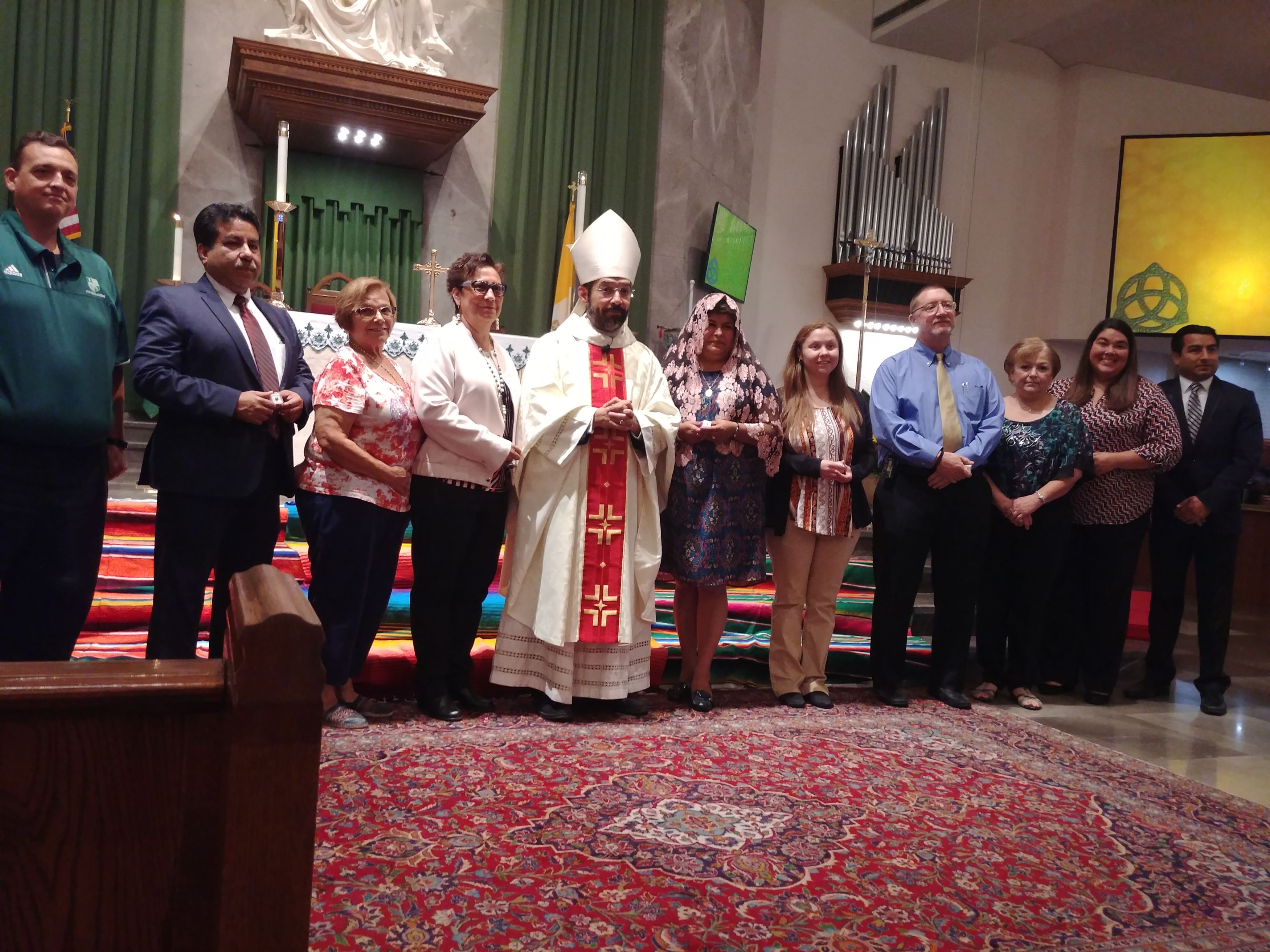
10 Years
- Ms. Yari Gonzalez
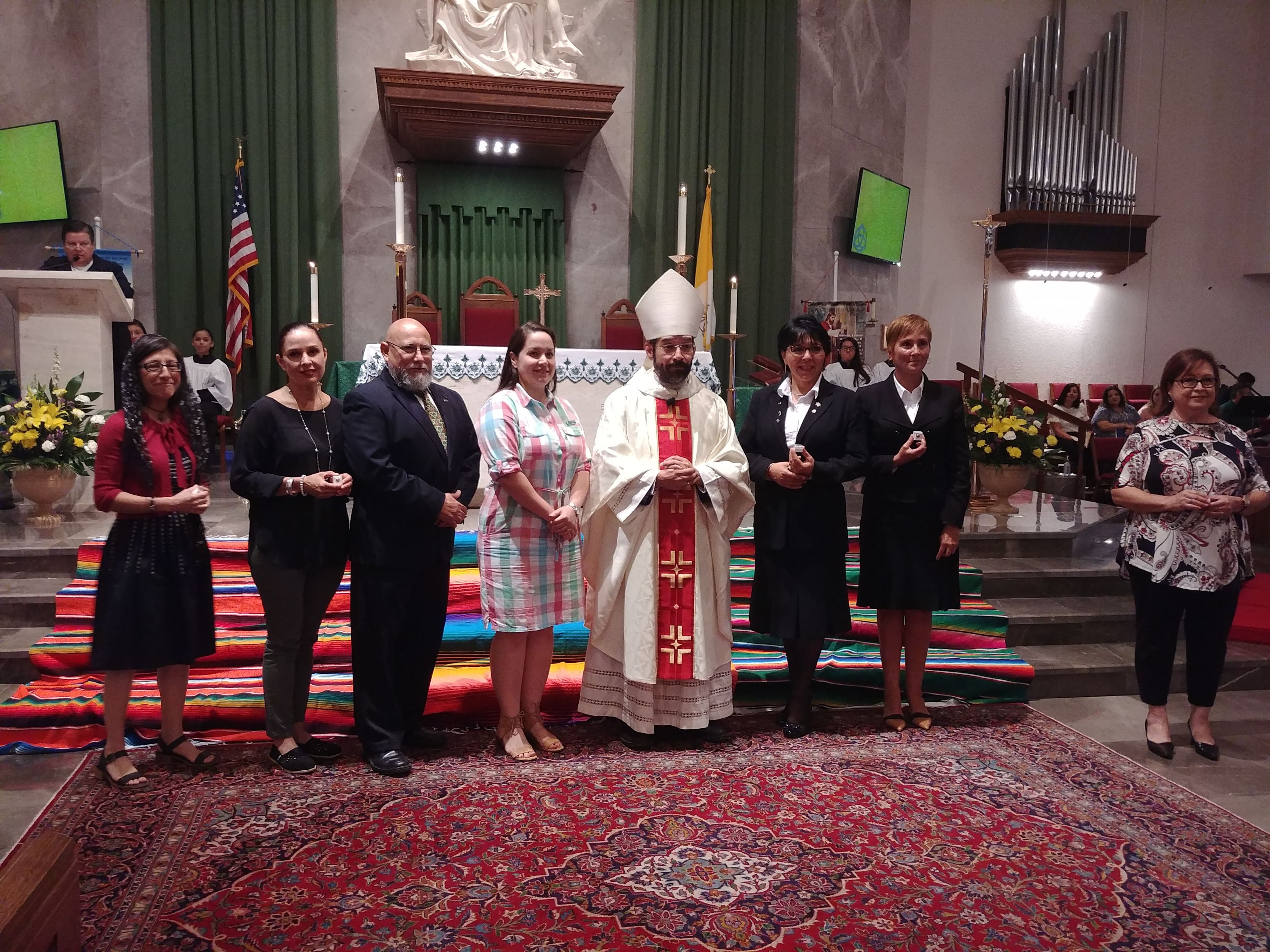
15 Years
- Ms. Norma Garcia
- Ms. Yuri Guerra
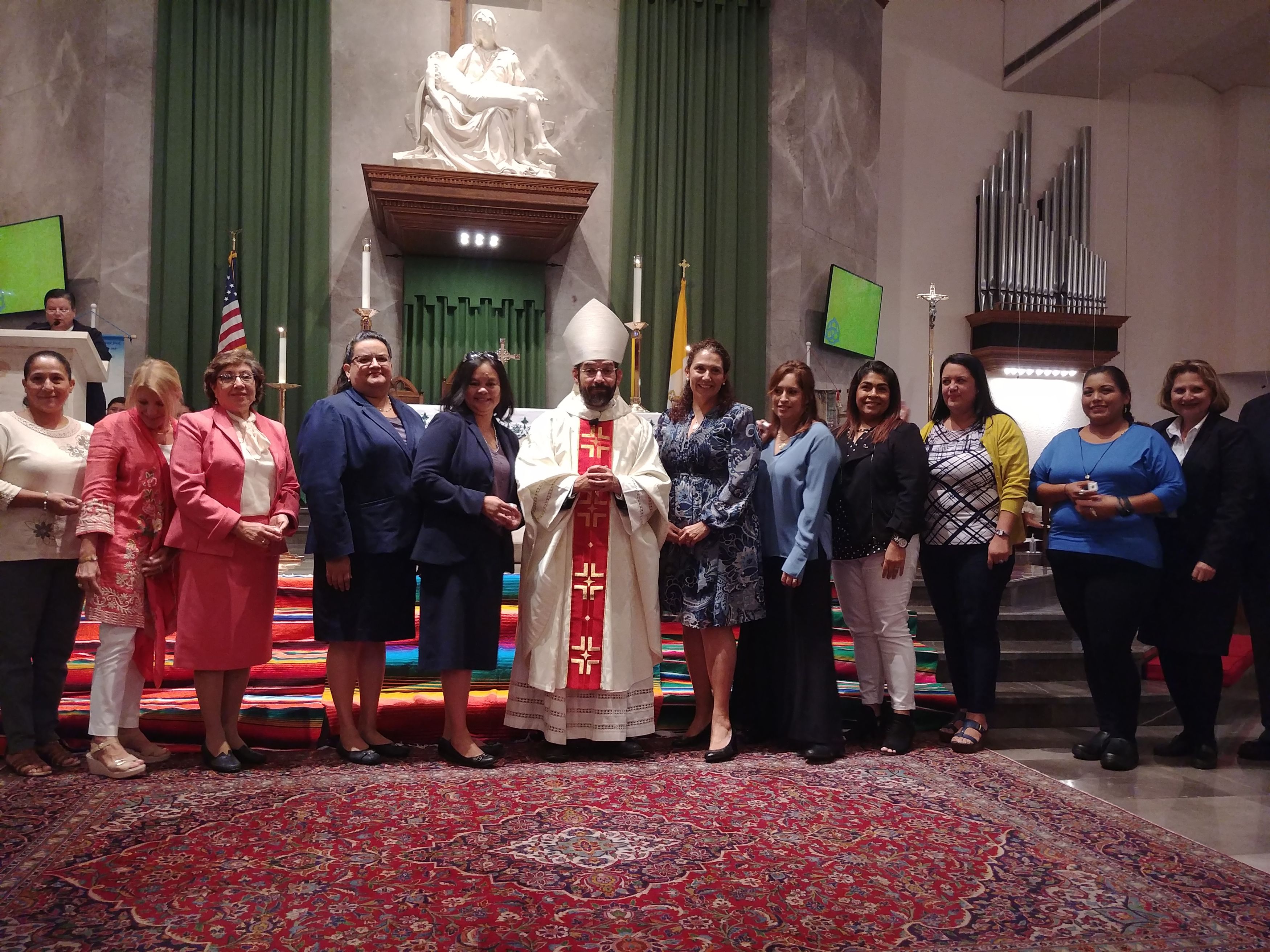
25 Years
- Ms. Mary Ann Aguilar
- Ms. Luisa DeLeon
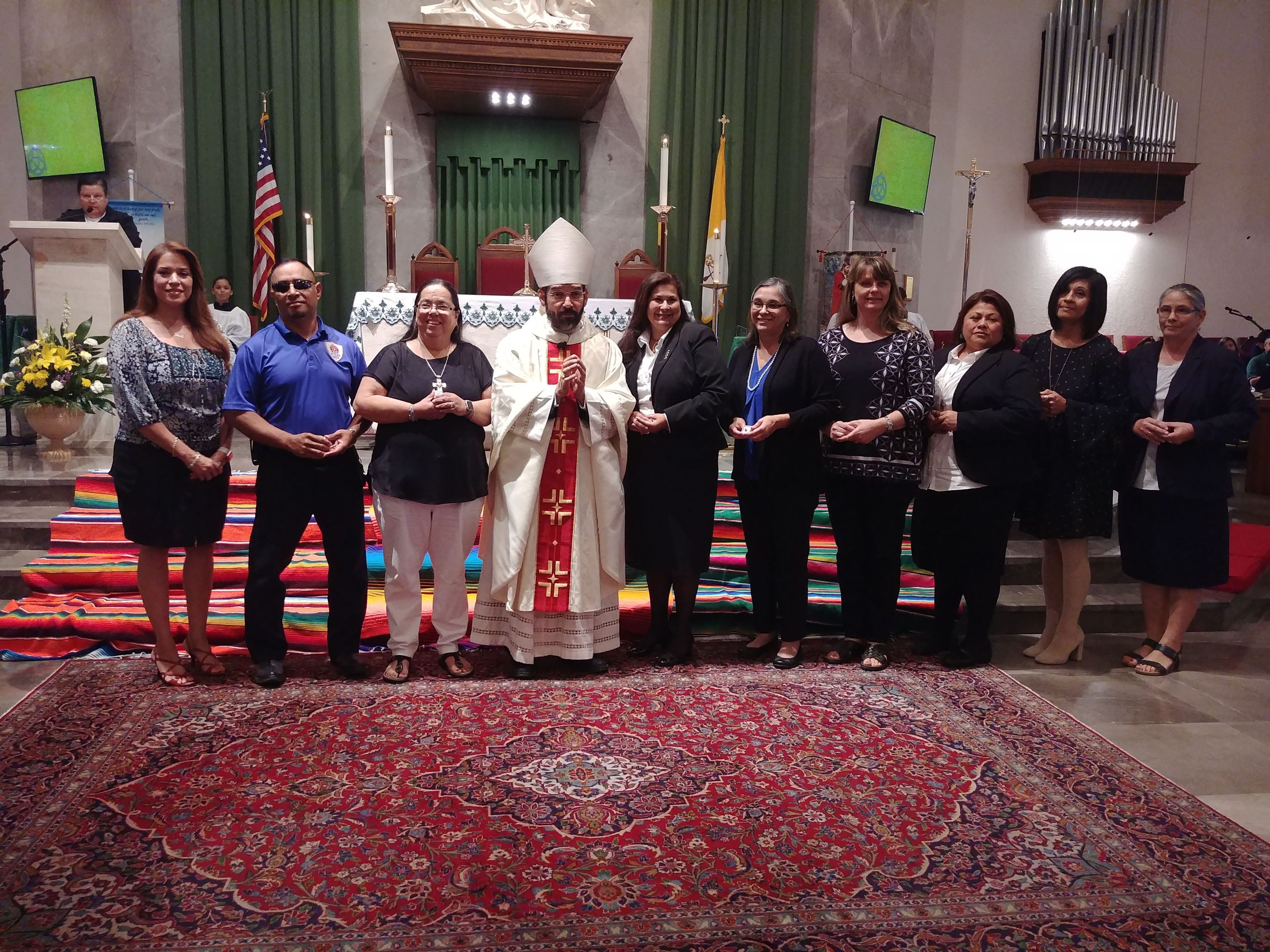
35 Years
- Ms. Oliva Garza
.jpg)
Our prayers and thanks go out to these OLS faculty & staff membes for their dedication, their service, their sacrifice and their fidelity to the vocation of Catholic education.
Blessings & Peace,
Hugo De La Rosa III
